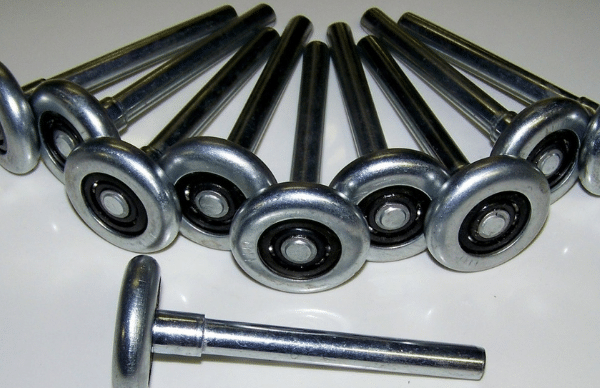
Garage Door Rollers
Garage door rollers support the weight of your garage as it moves along the track. The rollers are held in place by hinges which consist of a top, middle and bottom bracket. Rollers can be the cause of noisy operation and are often replaced when a new door or opener is installed. In this article, we’ll answer some common garage door roller questions.
Disclaimer
Rollers can be replaced by proficient DIYers, but we always recommend hiring a professional. Garage doors and their parts are dangerous and can cause irreparable harm if repairs are not performed properly.
How to measure garage door rollers?
Roller dimensions include the disc diameter and stem length. The stem refers to the shaft connected to the disc-like roller. The diameter of the shaft is standard and should be 7/16” but they do vary in length depending on door type. Roller diameters for homes are 2” but the actual width is more like 1 ¾”, like how a 2” x 4” doesn’t measure quite 2” wide by 4” tall.
What are the different types of garage door rollers?
Rollers are made of rubber, nylon, or steel. We recommend nylon rollers with ball bearings, protected by an end cap or seal. We opt for these rollers because they are quieter and don’t need lubrication. The seal extends the life of the rollers by keeping dirt and debris away from the bearing. Steel rollers are louder than nylon but they last the longest and are less expensive.
How much weight can a garage door roller support?
If you’re replacing rollers, find out how much the current door weighs by looking for a sticker on your garage door. If you’re buying a new garage door, have your company tell you the weight and how they determine the rollers.
Garage door rollers are rated for cycles. The usage numbers are pretty straightforward and easy to understand. For example, this nylon roller’s rating is 75 lbs. per roller at 15,000 12′ door cycles. This means a single roller can support 75 lbs and it will last for 15,000 cycles on a 12-foot door. On my five section, two car garage door, I have 12 rollers (six on each side) so it’s okay that only one roller can support 75 lbs. These 13-ball nylon rollers could support a door up to 900 lbs (12 rollers x 72 lbs per roller). Avoid using rollers that cannot support the weight of your door.
In summary, nylon rollers are quieter, don’t need lubrication, but cost more than steel. The more bearings in the roller, the longer the life expectancy and higher the price. Compared to nylon, steel rollers, are stronger, last longer, and are less expensive. The reason nylon is more popular is because they’re quieter.
At Heritage Garage Door, we service garage doors and their parts. If you’re shopping for garage door items in Southern California, look at our garage doors, openers, and accessories.



